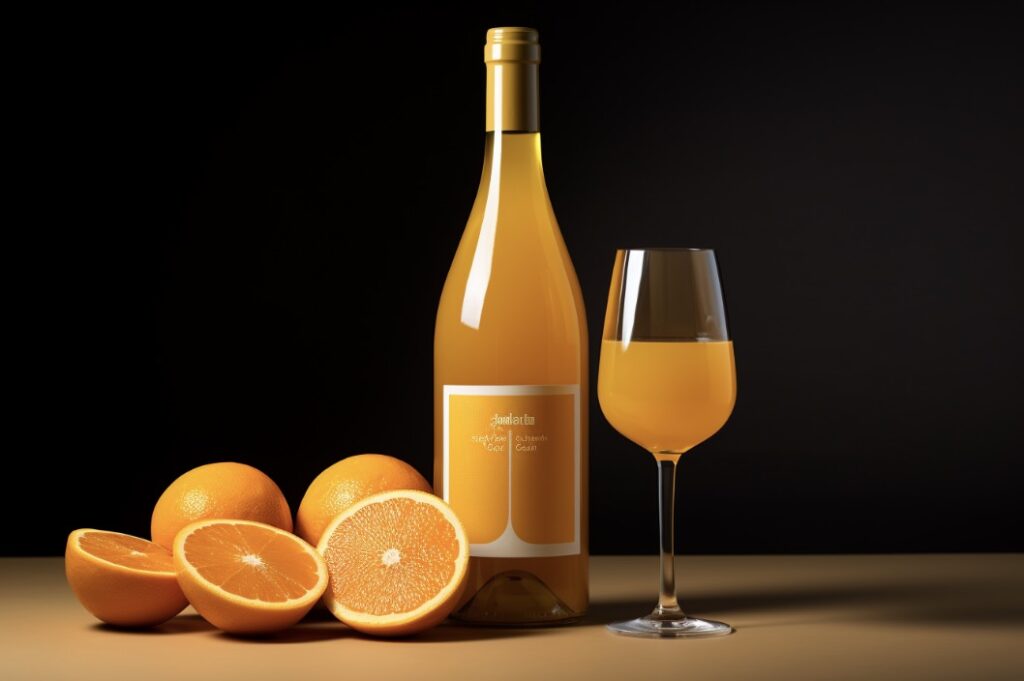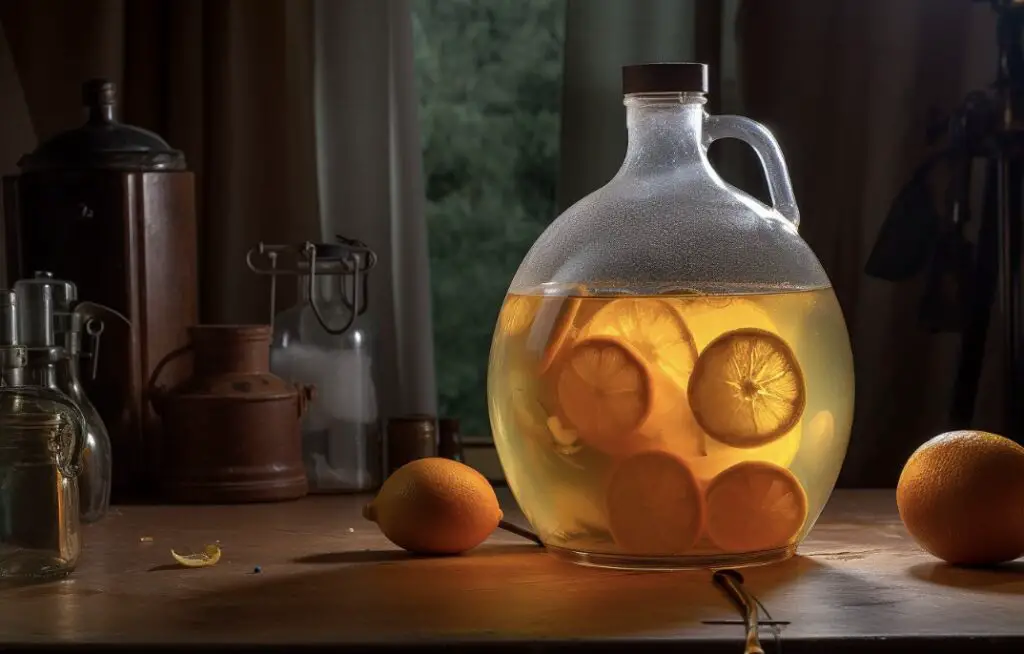Can you make wine from oranges? The short answer is yes, you absolutely can! As a homebrew enthusiast, I’ve experimented with a variety of fruits and ingredients, and orange wine is a delightful creation that’s relatively easy to make.
In this blog post, I will share my personal experience with making orange wine, as well as the process, tips, and some interesting facts about this unique concoction. So let’s dive in!
History of Orange Wine
Orange wine, despite its name, is not a new type of wine made from oranges. In fact, the term “orange wine” has been used for centuries to describe a specific style of winemaking that involves fermenting white grapes with their skins and seeds, which gives the wine an orange hue.
This ancient winemaking technique dates back thousands of years to the Caucasus region, which is now modern-day Georgia.

In recent years, however, the term “orange wine” has been appropriated by adventurous homebrewers like myself to describe wine made from actual oranges. As it turns out, oranges can be fermented into a delicious and unique wine that’s perfect for sipping on a warm summer day.
Choosing the Right Oranges
The first step in making orange wine is selecting the right oranges. Choose oranges that are ripe, juicy, and bursting with flavor. Navel oranges, Valencia oranges, and blood oranges are all excellent choices for making orange wine.
Avoid using overly sweet or bland oranges, as their flavors won’t translate well into the final product.
When selecting your oranges, also consider the sugar content.
The sugar in the fruit will be converted into alcohol during fermentation, so it’s essential to have enough sugar to produce a wine with a pleasant alcohol content. A good rule of thumb is to have around 12-15% sugar by weight in your oranges.
Preparing the Oranges
Once you’ve selected your oranges, it’s time to prepare them for fermentation. Start by washing and sanitizing your oranges thoroughly.
Next, peel the oranges, making sure to remove as much of the white pith as possible, as it can impart a bitter taste to the wine. You can use a vegetable peeler or sharp knife to do this.
After peeling the oranges, roughly chop them and remove any seeds. You can either use a food processor to puree the fruit or simply mash it with a potato masher or fork. The goal is to break down the fruit enough so that the juice can be extracted during fermentation.
The Fermentation Process
To make orange wine, you’ll need the following ingredients and equipment:
– Oranges (as discussed above)
– Sugar (to boost the alcohol content and sweetness)
– Water (to dilute the juice and create a balanced wine)
– Wine yeast (I recommend using a white wine yeast for orange wine)
– Fermentation vessel (a food-grade bucket or carboy)
– Airlock (to allow carbon dioxide to escape during fermentation)

Here’s a simple orange wine recipe to get you started:
1. In a large pot, combine the chopped oranges, sugar, and enough water to make a total volume of one gallon.
2. Heat the mixture gently, stirring to dissolve the sugar. Do not boil.
3. Once the sugar has dissolved, allow the mixture to cool to room temperature.
4. Transfer the cooled mixture to your fermentation vessel, making sure to leave enough headspace (space at the top of the container) for fermentation.
5. Add the wine yeast, stirring gently to incorporate.
6. Attach the airlock to your fermentation vessel, and let the mixture ferment in a dark, temperature-controlled environment (around 60-70°F) for 2-3 weeks.
7. After fermentation, carefully siphon the wine off the sediment and into a clean, sanitized container. Age the wine for at least three months before bottling.
Bottling and Aging Your Orange Wine
Once your orange wine has aged and is ready to be bottled, you’ll want to choose an appropriate bottle and closure. I recommend using clear glass bottles with cork closures to showcase the beautiful orange color of your homemade wine.
When bottling your wine, leave a small amount of headspace in each bottle to allow for any potential expansion. Once your wine is bottled, store it in a cool, dark place to continue aging. Orange wine can be enjoyed young, but it will also develop more complex flavors and aromas with age.
Serving and Enjoying Orange Wine
Orange wine is best enjoyed chilled, at around 45-50°F. Due to its unique flavor profile and acidity, it pairs well with a variety of foods, including grilled vegetables, seafood, and spicy dishes. You may also enjoy sipping your orange wine on its own, as a refreshing summer beverage.
Conclusion
In conclusion, making wine from oranges is an adventurous and rewarding endeavor that can result in a delicious and unique beverage. To summarize, here are some key facts about orange wine:
1. Orange wine can indeed be made from actual oranges.
2. Choose ripe, flavorful oranges for the best results.
3. Remove the white pith and seeds during preparation.
4. Use a white wine yeast for fermentation.
5. Ferment at a controlled temperature (60-70°F) for 2-3 weeks.
6. Age the wine for at least three months before bottling.
7. Bottle in clear glass bottles with cork closures.
8. Orange wine pairs well with a variety of foods.
9. Serve chilled, at around 45-50°F.
10. Experiment with different orange varieties and recipes to create your perfect orange wine.
Happy brewing, and enjoy your homemade orange wine!
FAQs
Can wine be made from orange?
Yes, wine can be made from oranges. Orange wine, also known as amber wine, is made by fermenting the juice of oranges. However, it is important to note that orange wine is quite different from traditional grape wine in terms of flavor, color, and production methods.
Why is there no orange wine?
Orange wine does exist, contrary to the misconception that it doesn’t. It is a style of wine made by fermenting white grapes with their skins, similar to red wine production. The resulting wine has an orange or amber color, hence the name. This process allows for extended contact between the grape juice and the skins, resulting in a unique flavor profile and tannin structure. Orange wines have been produced for centuries, particularly in regions like Georgia and Slovenia, and their popularity has been growing in recent years.
Can you make liquor out of oranges?
Yes, you can make liquor out of oranges. Orange liqueurs, such as Triple Sec or Curaçao, are popular examples. Additionally, you can infuse orange peels or juice into spirits like vodka or rum to create flavored liquors.
What countries make orange wine?
Orange wine is made in several countries around the world. Some notable producers include Slovenia, Georgia, Italy, Croatia, and France. These countries have a long history of producing orange wines using traditional methods and indigenous grape varieties.
What is wine made from oranges called?
Wine made from oranges is commonly known as orange wine.
What happens if you ferment oranges?
When oranges are fermented, the natural sugars in the fruit are converted into alcohol by yeast or bacteria. This process is similar to the fermentation of other fruits, such as grapes for wine or apples for cider. The resulting product can vary depending on the specific fermentation method used and the desired outcome. It can range from a mildly alcoholic orange wine to a more acidic and tangy orange vinegar. Fermenting oranges can enhance their flavors and create unique taste profiles, making them a popular ingredient in various culinary applications.




